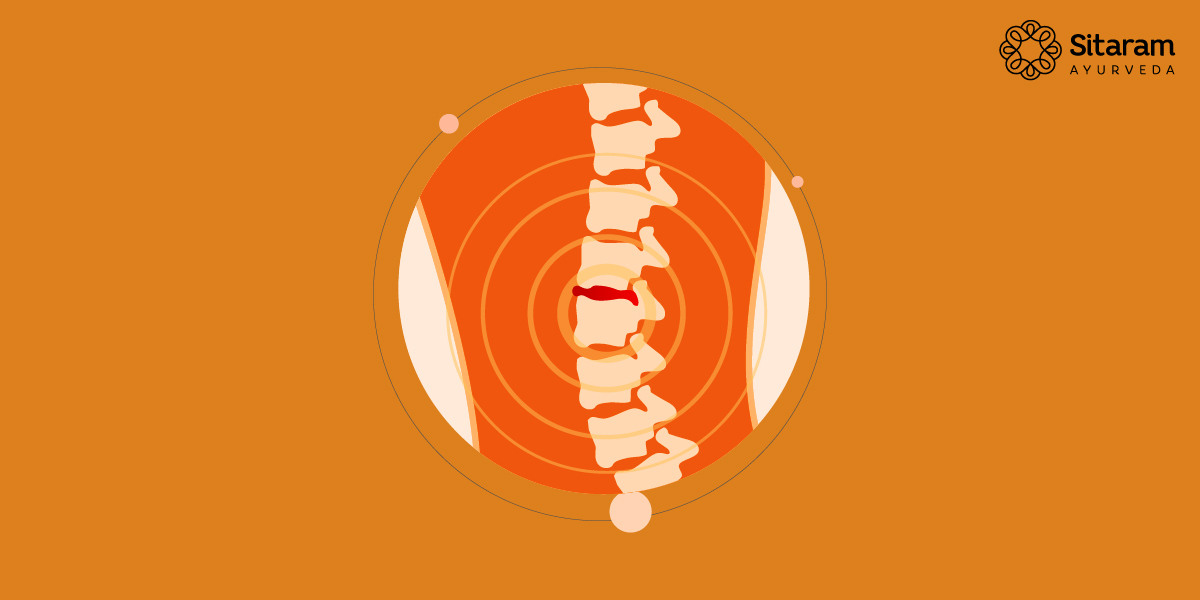Healing Lumbar Disc Bulge Naturally

Are you bothered by the lumbar spine-widening ache and sudden stiffness in your movements? You’ve had enough of being counseled against risky surgical repair. What if we plan to provide you relief using a natural method? We’ll tell you why a herniated disc shouldn’t be the end of your life.!
Why ayurveda.?
Ayurveda employs a comprehensive approach to wellbeing, seeking to identify and address the underlying causes of your problems rather than merely addressing the symptoms themselves. One of the fundamental elements of this healing practice is re-establishing equilibrium in your neurological system, in addition to dietary adjustments and mind-body practices like yoga and meditation. Using particular herbs that can help lessen pain, increase circulation, and nourish those nerves is one method to handle this.
Ayurveda and disc bulge
Ayurvedic medicine offers a natural, non-surgical alternative to treat the symptoms of a herniated lumbar disc.
Herniated disc/lumbar disc herniation is the medical term for when the intervertebral disc, a spongy cushion-like structure located in the lumbar area of the lower back, protrudes and compresses the spinal cord or nerves.
What’s the reason.?
Well…Wear and tear brought on by aging is the most frequent reason. Other causes also include:
- Excessive physical activity.
- Lumbar spine stress from prolonged bending, stretching, driving, etc.
- Being overweight, and even
- Inactivity.
Signs and symptoms
Herniated lumbar discs are a fairly prevalent yet frequently unrecognized source of discomfort. Back pain and leg pain that radiates from the buttock down the leg are the most typical signs of nerve root compression. Depending on which nerves are impacted, it may also cause certain sensory anomalies, muscle weakness, or function loss. Mild disc herniation may not result in any signs or symptoms, but if it does, the person will likely feel low back pain, hip, groins, thigh, and leg pain, numbness over the hips and legs, difficulty walking, among other symptoms.
Ayurvedic analysis: lumbar disc herniation
According to Ayurveda, “vatavyadhi” refers to illnesses affecting the nerves, muscles, bones, ligaments, tendons, and associated structures. Pain, numbness, difficulty moving, etc. are symptoms. Here, kapha (sleshaka kapha, which is located in the joints) is diminished while vata is inflamed. The vatavyadhi-like disease known as gridhrasi is described by lower back/hip to leg discomfort radiating.
Common causes include ageing, excessive activity, improper postures, sedentary behaviour, trauma, and vata vriddhi (aggravation of vata). Vata is also made worse by overindulging in bitter or astringent flavours, skipping meals, sleeping late at night, traveling, prolonged sitting, etc.
Ayurvedic Management for Disc Bulge
The goal of treatment is to lessen symptoms and build stronger back muscles. Internal medications along with procedures like:
- Rukshana (for drying the AMa dosha) Snehana (oil massage)
- Swedana (sudation therapy)
- Nasya (nasal instillation of medicine)
- Virechana (purgation therapy)
- Vasthi (enema)
- Lepana (external application of medicines)
- Bandaging,
- Kati vasthi (retention of medicated oil over the affected part) etc are available for maximum benefits.
Additionally, supportive therapies including physiotherapy, yoga, meditation, and psychotherapy are provided.
Diet:
Diet is a very important factor. A healthy diet can stop a disease from developing, lessen its symptoms, and make recovery simple. Hence maintain a healthy diet that won’t aggravate vata. Whole grains, vegetables, nuts, fruits, milk, tiny fish, and other foods must be included in the diet. Avoid eating curd, peas, tubers, cold, dry food and skipping meals as these practices and habits aggravate Vata dosha.
As directed by your doctor, you can engage in some light activity. Also, Yoga has additional benefits in maintaining balance of the body.
Ayurvedic prevention strategies:
- Prevent overdoing it.
- Make sure you give your lower back enough time to recover between labour-intensive tasks.
- To sleep comfortably, use a bed and pillows.
- Before taking a bath, rub your body well with an appropriate oil.
- Preserve a healthy body weight.
- Get frequent exercise.
- Try to get adequate rest
- Reduce the likelihood of accidents, falls, etc.
The optimal course of treatment will depend on a number of factors, including your general health, the intensity of your symptoms, and others. If your symptoms are minor, you might be able to get rid of them by resting, using ice, taking painkillers, and getting physical therapy. The herniated disc may need to be removed surgically if your symptoms are more severe or do not get better with conservative treatment. However, in many instances, ayurveda can offer a non-surgical remedy that resolves the issue without the need for surgery.


 Sign In
Sign In Cart
Cart